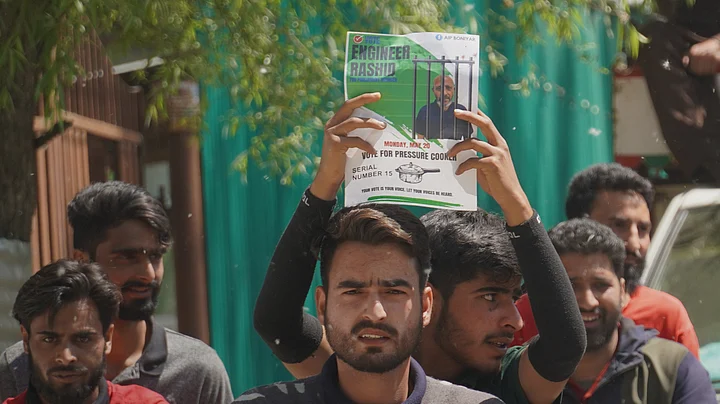The message from the Jammu and Kashmir (J&K) electorate in this election is not along the lines that the government would have wanted — at least what it seemed to want for most of the five years since its monumental constitutional changes, which included the demotion of J&K to a union territory and the separation of Ladakh as a separate union territory. As I have recently noted, what it now wants is unclear, for it seems to be reversing its strategies.
If indeed that is the case, it would account for the resounding victory of 'Engineer' Rashid from Baramulla. As I pointed out in a recent article, not only was Rashid permitted to contest from Tihar Jail, but his sons were given a lot of leeway to campaign. If he is released from jail to attend Parliament, he could be a very tendencious voice in the house.
He seemed to be on the road to winning nearly double the votes of National Conference Vice-President Omar Abdullah, and close to three times as many as People’s Conference chief Sajad Lone—who was supposed to be backed by the BJP.
For years after the constitutional changes, those in power appeared to be making a Herculean effort to win approval from elected representatives of J&K. A delimitation commission and its advisors tried their best to gerrymander constituencies that might allow the BJP and its allies to win and install a Hindu chief minister. They wanted more than anything at that stage to get a state assembly to give those constitutional changes a stamp of approval.
At the least, they had hoped that their nominees, and those loosely allied with them, could win Lok Sabha seats from there. For, the current elections are the first major opportunity for the people’s voice to be heard since those constitutional changes.
Possible Winners
The more troubling message for the BJP is from the two Hindu-dominated constituencies, Jammu and Udhampur. The Congress has given the BJP a creditable run for its money for both seats. Clearly, the constitutional changes were not a factor—either for BJP-backers or for Congress supporters.
Indeed, through the campaign and after the polling machines had been sealed, there was strong local uncertainty over whether the Minister of State in the Prime Minister’s Office, Jitender Singh, would be able to retain the Udhampur seat. Most were sure he would not.
Even some of those who have campaigned vigorously for Hindutva-driven issues in the past say they voted determinedly against what they describe as his arrogant unresponsiveness. If Lal Singh of the Congress had won that seat, which most observers took for granted as a Modi-BJP bastion over the past decade, it could have been one of the highlights of the results—like Rashid taking the Baramulla seat.
That result from Baramulla should worry those who thought the people of the union territory had accepted the constitutional changes. For, Rashid got most of the votes of youth in north Kashmir—the demographic that is most potentially volatile.
Plus, on the political plane, locals say Rashid got several votes even in Pahadi-dominated Karnah, an assembly segment which would have been considered least likely to back him. After all, the BJP government went out of its way to grant scheduled caste status to Pahadis in the union territory in February.
Rashid’s win will be widely seen as a vote against integration—indeed, for separatism.
Secular Successes
Even the two NC likely victories denote voters’ rejection of the constitutional changes. For, the NC was at the forefront of the Gupkar Alliance which stood strongly against the changes. Not only is the NC a member of the INDIA bloc, but it has appeared to be almost as much a bugbear for the ruling establishment as the Congress.
Not only did NC candidates seem likely to win the Srinagar and Anantnag-Rajouri seats, but their margins were almost as spectacular as Rashid’s in north Kashmir.
That Mian Altaf fared so well despite the postponement of the poll and then Home Minister Amit Shah apparently urging Pahadi leaders to back Zafar Manhas of Apni Party during a recent visit to the union territory is a notable setback for the BJP.
If those close to the ruling establishment now go to court to have Aga Rohullah disqualified over a date of birth affidavit soon after he wins the Srinagar seat for NC, it will signal that the ruling establishment depends on factors other than the will of the people—especially after the Election Commission earned mistrust over opaque statistics.
Game On?
Now that most of the votes have been counted for all five seats in the UT, it seems that spin doctors may be hard-pressed to project the results as signalling approval for the constitutional changes. Not just that, some believe that the campaigns may have helped to lay the ground for renewed trouble.
Of course, politics makes unexpected bedfellows, particularly at a time of money, muscle, and investigative power. So, it is quite possible that the BJP could draw the support of some of those who win, even if these winners may have campaigned against them.
Alternately, the behaviour of some of the victors in the house might obliquely suit those who seek polarisation.
As is colloquially said, Abhi khel baaki hai (the game isn’t over).
(The writer is the author of ‘The Story of Kashmir’ and ‘The Generation of Rage in Kashmir’. He can be reached at @david_devadas. This is an opinion piece and the views expressed above are the author’s own. The Quint neither endorses nor is responsible for the same.)
